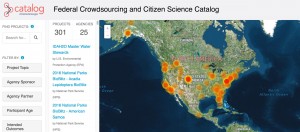22 April 2016
Data from the masses: Crowdsourcing and citizen science enhance the scientific process
Posted by Nanci Bompey
By Leslie Hsu and Sophia B. Liu
This is part of a new series of posts that highlight the importance of Earth and space science data and its contributions to society. Posts in this series showcase data facilities and data scientists; explain how Earth and space science data is collected, managed and used; explore what this data tells us about the planet; and delve into the challenges and issues involved in managing and using data. This series is intended to demystify Earth and space science data, and share how this data shapes our understanding of the world.

A newly released catalog of Federally-funded Crowdsourcing and Citizen Science Projects can be accessed at citizenscience.gov.
Credit: General Services Administration.
Witness a landslide, feel an earthquake or observe the first buds of spring? Take out your cell phone and report a data point.
Personal devices like cell phones, tablets and laptops are making it easier than ever for the general public to contribute important data and analysis to a wide range of scientific research projects. In turn, scientific research is enhanced and accelerated by these relatively new and potentially massive streams of data. This data stream can come from Crowdsourcing or Citizen Science (the pair of terms is commonly abbreviated as CCS). Citizen Science uses volunteers from the general public to further science, while Crowdsourcing obtains needed services, ideas or content by soliciting contributions from a large group of people for distributed problem solving.
CCS allows citizens to be involved in all parts of the scientific process. At the most basic level, they act as sensors, such as reporting sightings of natural events or species (e.g., Did you See It?, Did you Feel It?, iPlover, Nature’s Notebook). Volunteer citizens can also perform scanning or transcribing of documents, helping to increase the rate of data entry by orders of magnitude (e.g., Old Weather, Citizen Archivist). At the next level, human visual analysis can be leveraged to perform tasks that may not yet be possible or efficient with computers, such as annotating coastal change after extreme storms or classifying animals caught in “camera traps” in the wild (e.g., iCoast, Snapshot Serengeti). Finally, challenges and hackathons provide a competitive aspect to participatory science, presenting technical, scientific, ideation, and creative competitions to the public in search of innovative solutions and fresh ideas (e.g., challenge.gov).
Although there has been a notion that the quality of data or analysis from CCS may be inferior to that coming from trained scientists, many CCS applications employ processes to assure quality, such as checking for agreement from multiple participants. Often the sheer volume of data lends itself to new informative filtering and threshold methods that would not be possible with the amount of data that a single investigator or project team could gather.
The federal government recognizes that CCS volunteer effort is of significant economic, educational, and outreach value. In September 2015, the Office of Science and Technology Policy (OSTP) released the memorandum Addressing Societal and Scientific Challenges through Citizen Science and Crowdsourcing. A new website, citizenscience.gov, has just been released, featuring a catalog of federally supported CCS projects, a toolkit to assist with designing and maintaining projects and a gateway to a federal community of practice to share best practices.
Citizen Science “Day” kicked off on April 16, 2016 and runs through May 21, 2016. The celebration brings attention to citizen science impacts and participation opportunities. Events will be held throughout the United States, and you can search for one near you on SciStarter, a site where you can search, find and join Citizen Science activities.
Even if you are already a scientist, CCS gives you an opportunity to explore and contribute to new and horizon-broadening projects in the role as a citizen volunteer. Ready to get involved in a CCS project? Here are a few ways to start:
- Visit the new CitizenScience.gov site to browse the catalog of over 300 CCS projects
- Find a project to participate in on SciStarter
- Use the Federal CCS Toolkit to help you put together your own CCS project
- Follow @FedCitSi, @SciStarter, and #CitizenScience on Twitter
— Leslie Hsu is Coordinator for the USGS Community for Data Integration, which includes many CCS enthusiasts and a Citizen Science Working Group. Sophia Liu is an Innovation Specialist at USGS and is helping to coordinate the USGS and Department of the Interior Federal Citizen Science Catalog effort.


 GeoSpace is a blog on Earth and space science, managed by AGU’s Public Information staff. The blog features posts by AGU writers and guest contributors on all sorts of relevant science topics, but with a focus on new research and geo and space sciences-related stories that are currently in the news.
GeoSpace is a blog on Earth and space science, managed by AGU’s Public Information staff. The blog features posts by AGU writers and guest contributors on all sorts of relevant science topics, but with a focus on new research and geo and space sciences-related stories that are currently in the news.